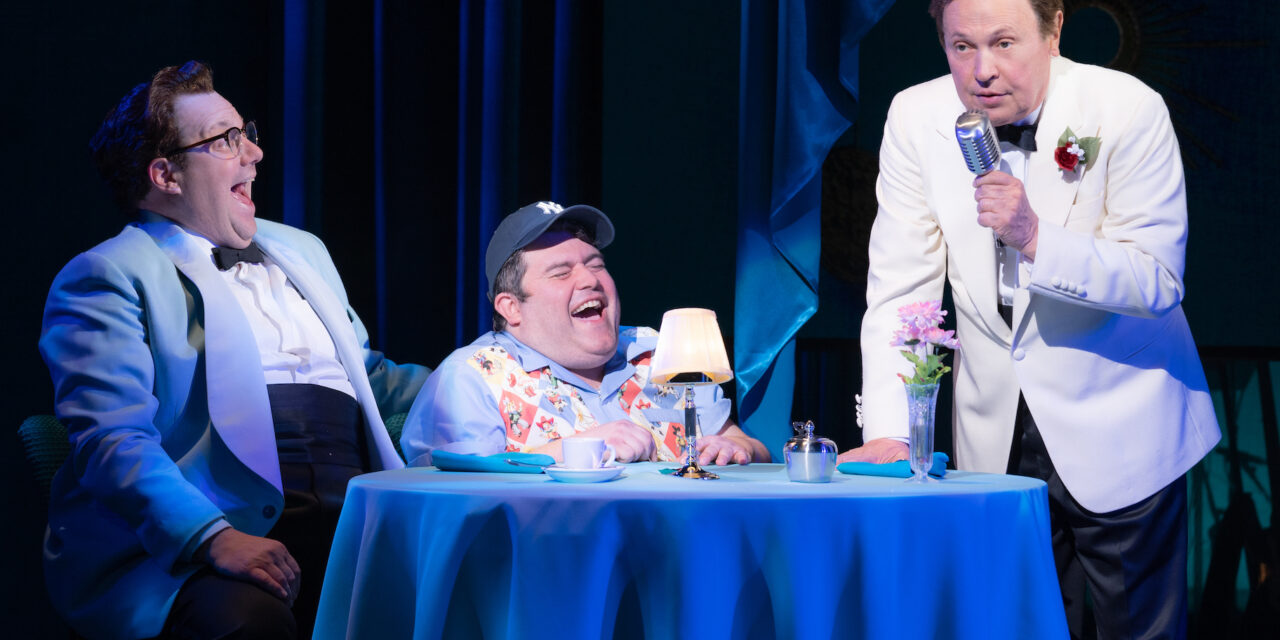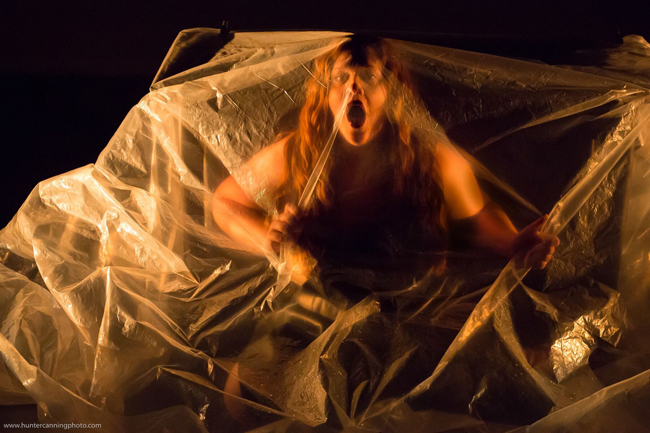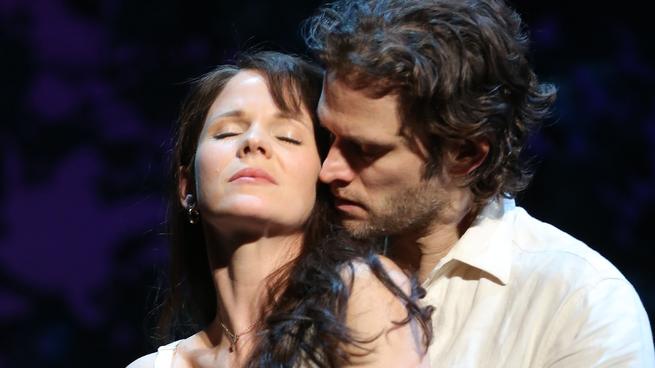By Samuel L. Leiter . . .
In 1992, comedian Billy Crystal made his movie directing debut with Mr. Saturday Night, which he co-wrote and in which he also starred as Buddy Young, Jr., a washed-up Borscht Belt-era comedian. It received mixed reviews, and, while co-star David Paymer, as his brother, garnered an Academy Awards Best Supporting Actor nomination, it was a box-office flop.
Mr. Crystal, who exemplifies the adjective “spry,” is now starring in a very funny, mildly poignant, but imperfect, Broadway musical adapted from the film. It seems to be doing relatively better than the movie, with five Tony nominations, including for the star and show.
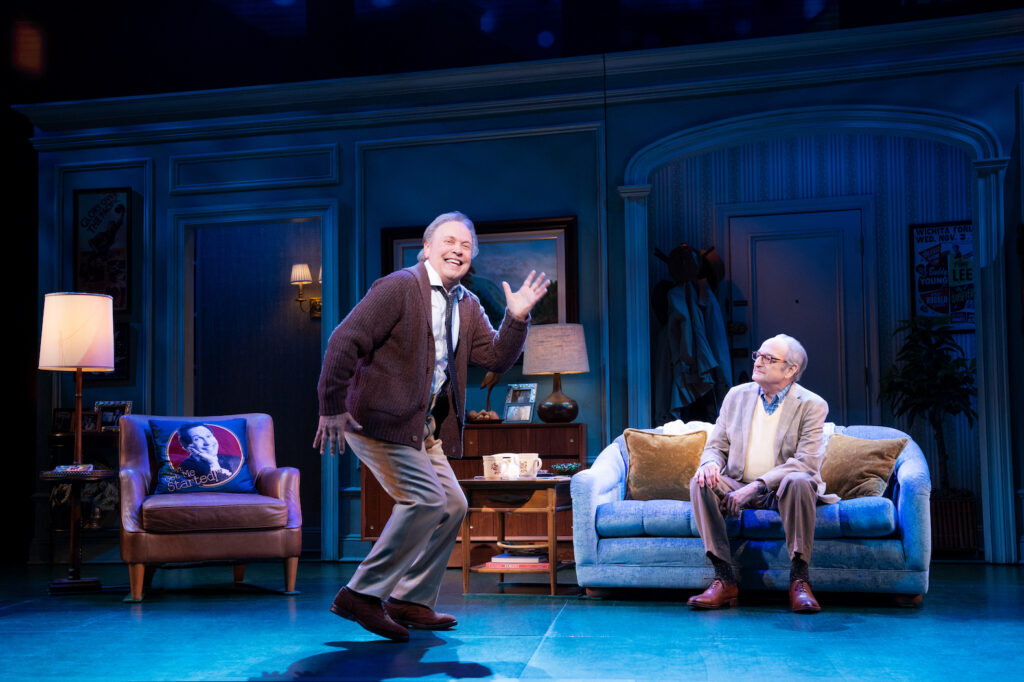
The movie (like the show) presents Buddy both in his prime and in old age, the latter having required him to spend six hours daily having wrinkles and wattles applied. On stage, however, aside from a wig, Mr. Crystal, 74, needs no such makeup, and, despite the evidence of a slight paunch, gets by as his younger self merely by switching wigs (and costumes). He sings, cavorts, dances (a bit), and shoots out one-liners like a semi-automatic rifle.
Then, after two and a half hours, when the standing ovation audience is beginning to move toward the aisles, he asks them to sit again so that, for ten minutes, he can take questions. I don’t know how he does it, but like what that lady says in Mr. Crystal’s movie, When Harry Met Sally, “I’ll have what he’s having.”
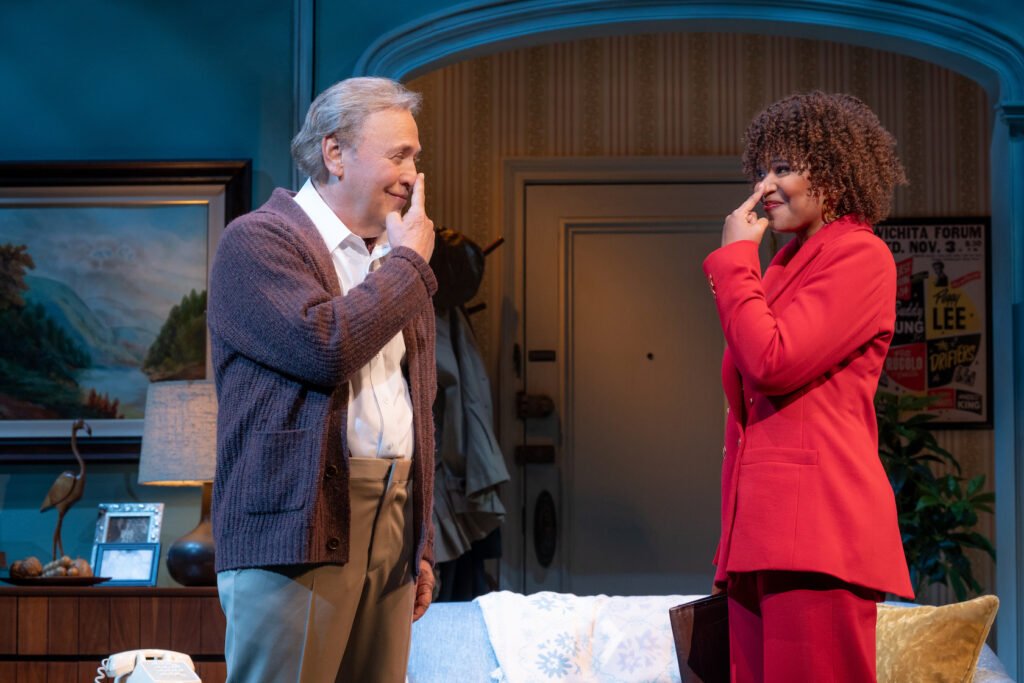

Buddy Young, Jr., a name concocted to cover his too ethnic-sounding “Yankleman,” gets his start in the late 1940s while working as a waiter at Farber’s Hotel in the Catskills, where he goes on one night in place of Milton Berle. Buddy’s brother, Sam (the wonderfully hangdog Mr. Paymer, repeating his movie role), previously his comic partner, is too shy to perform professionally, and becomes Buddy’s long-suffering manager. By chance, Buddy also wins the heart of Elaine (Randy Graff, at the top of her game), a young woman Sam already had fallen for.
Buddy, a rapid-fire, cigar-chomping comic in the Alan King mold, gets his own TV show, but blows it by saying something inappropriate about a rival show, “Davy Crockett,” and sees his career go down the toilet. Despite his obvious talents, he’s loud, selfish, unable to listen to advice, and prone to insulting not only those close to him, like his brother and estranged daughter, Susan (Tony-nominated Shoshanna Bean, a knockout), but even audiences. His new agent, Annie Wells (Chasten Harmon, excellent), gets him jobs, but, always thinking he knows better, he spoils his best shots.
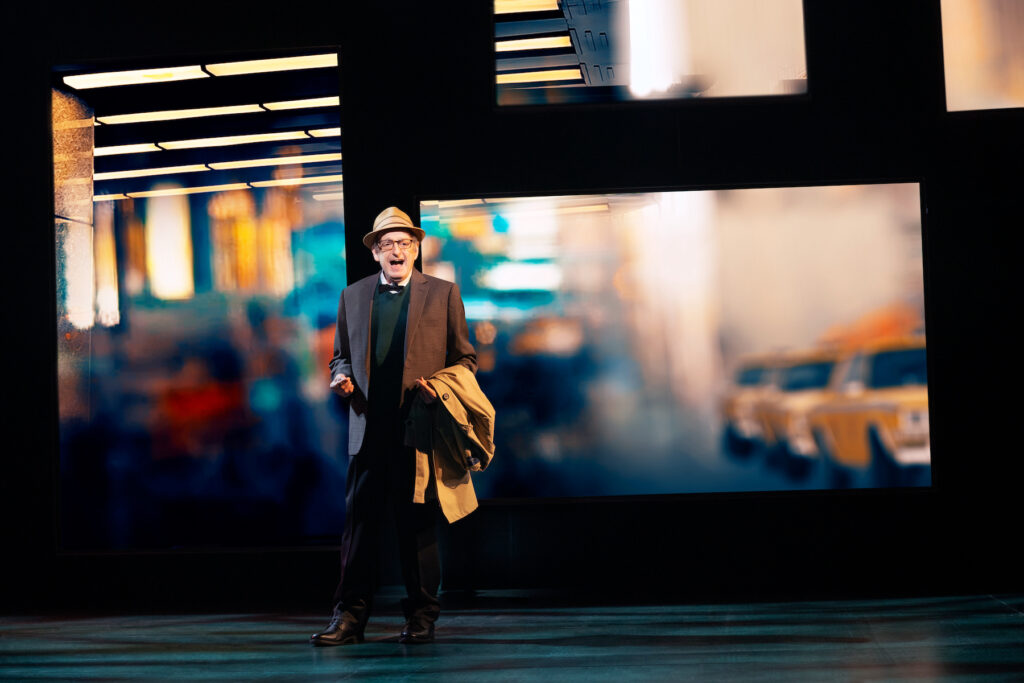

Just as the septuagenarian Buddy seems to have reached his career nadir, Annie gets him a shot at a great movie role. The hotshot director, Larry Myerson (Brian Gonzalez), who happens to be the son of the Farber’s Hotel owner, has never forgotten Buddy’s debut performance. But things don’t go as planned, Buddy’s arrogance rears, and it takes some plot contrivances before all works out for the best, including Buddy’s family relationships.
The Tony-nominated book, by the same team as did the film—Mr. Crystal, Lowell Ganz, and Babaloo Mandel—moves swiftly back and forth through the years, with a cast of only eight. A versatile trio—Jordan Gelber, Brian Gonzales, and Mylinda Hill—helped by the costumes of Paul Tazewell and Sky Switser, plays multiple roles. Economy seems also to have been behind the rather conventional set by Scott Pask, with lighting by Kenneth Posner, which makes much use of Jeff Sugg’s projections.
Mr. Saturday Night, briskly staged by John Rando, with serviceable choreography by Ellenore Scott that is more musical movement than dance, is essentially a chamber musical, eliminating visual excess in favor of a focus on the book. In fact, there are times that the songs seem almost an intrusion, as if the writers, feeling that perhaps too much book has gone by without one, feel the need to insert a musical routine. One such moment comes when Eileen fantasizes about “Tahiti,” a number that, while entertaining enough, seems inorganic.
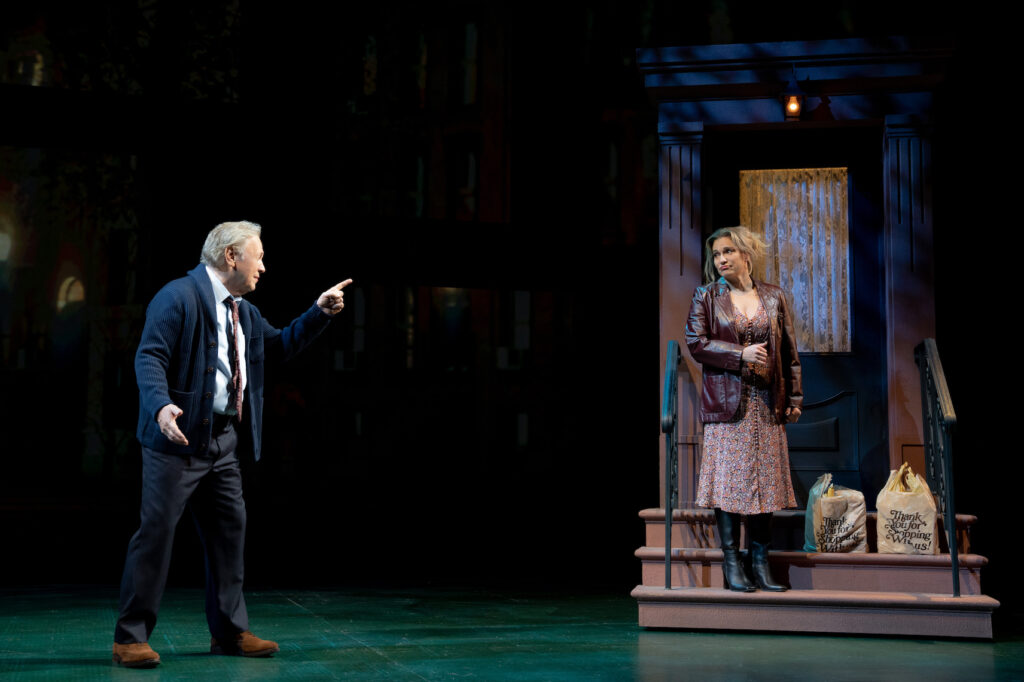

Composer Jason Robert Brown and lyricist Amanda Green may not have written any future musical theater standards, but their Tony-nominated score makes easy listening, with witty words and melodic tunes. Mr. Crystal gets a traditional eleven o’clock number, “Any Man but Me,” that requires as much acting as singing. While no one would ever think of him a great singer, he has enough vocal strength and personal charisma to make it work.
Most people visiting Mr. Saturday Night are there to see Mr. Crystal. He’s the only cast member without an understudy. I got to see the show so late only because he had the flu when I originally was booked. Given his great knowledge of and love for the kinds of comics he’s channeling—many named in the script and with their photos projected at the rear—it’s hard to see who could replace him. You’d need someone who could capture the self-assured cockiness, perfect timing, occasional profanity, and wise-guy shtick associated with the likes of Jewish comics like Phil Silvers, Shecky Greene, and so on. At the same time, he’d have to remain adorable enough to make you love him even when he’s spitting insults at you.
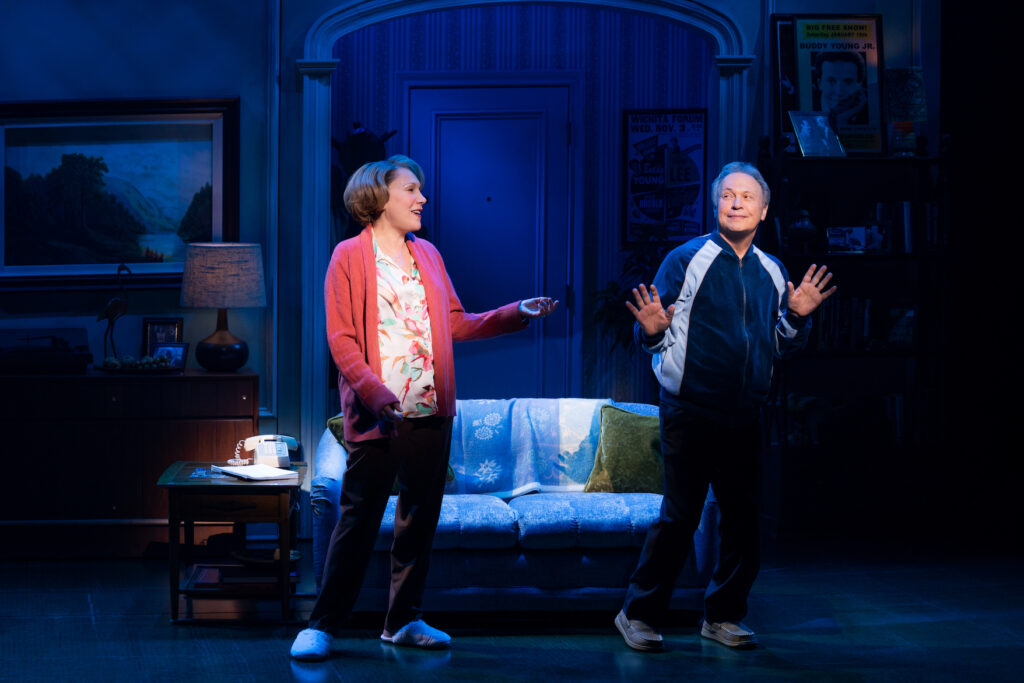

For all its pleasures, I wonder how many theatergoers would truly appreciate this comedic nostalgia. The sometimes schmaltzy book and characters are undeniably old-fashioned, geared to traditional old-time Broadway audiences. On two occasions during the first act, whitehaired people in my line of sight hobbled over others as they headed for the bathroom. Like me, they looked exactly like the seniors shown in projections representing the audiences Buddy plays to in his waning years.
I grew up going to Catskill hotels in the summers (even meeting comedian Jack Carter, mentioned in the show, when I was 12), waited tables there when I was in college, and went back one last time in the early 70s when I spent a weekend with my family at Brown’s. The comic was Jan Murray—I don’t remember if he’s cited in the script—but he told the same kinds of jokes as Buddy Young, many about bodily functions. I was in my early 30s, and I probably didn’t even realize yet what prostate problems were, but I laughed so hard the tears ran down my leg. Ba-da-boom. Mr. Saturday Night brought it all back, and then some.
Mr. Saturday Night.Through September 4 at the Nederlander Theatre (208 West 41st Street, between Seventh and Eighth Avenues). www.mrsaturdaynightonbroadway.com
Photos: Matthew Murphy


